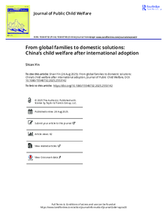China’s recent decision to end its international adoption program marks a pivotal shift in the nation’s child welfare landscape, concluding a 30 year policy that facilitated the placement of over 160,000 orphaned and abandoned children – many with disabilities and/or congenital diseases – into permanent families abroad. This policy change raises urgent concerns about the future of these vulnerable minors, particularly those with complex medical and developmental needs who are now at increased risk of prolonged institutionalization. This commentary explores the implications of this transition, emphasizing the potential developmental and psychosocial consequences for affected children. It proposes a set of actionable reforms, including the expansion of domestic adoption, the professionalization of foster and kinship care, the enhancement of institutional care quality, and the strengthening of cross-sector partnerships. These measures are essential to building a more inclusive, sustainable, and family-centered child welfare system in the post-international adoption era.

